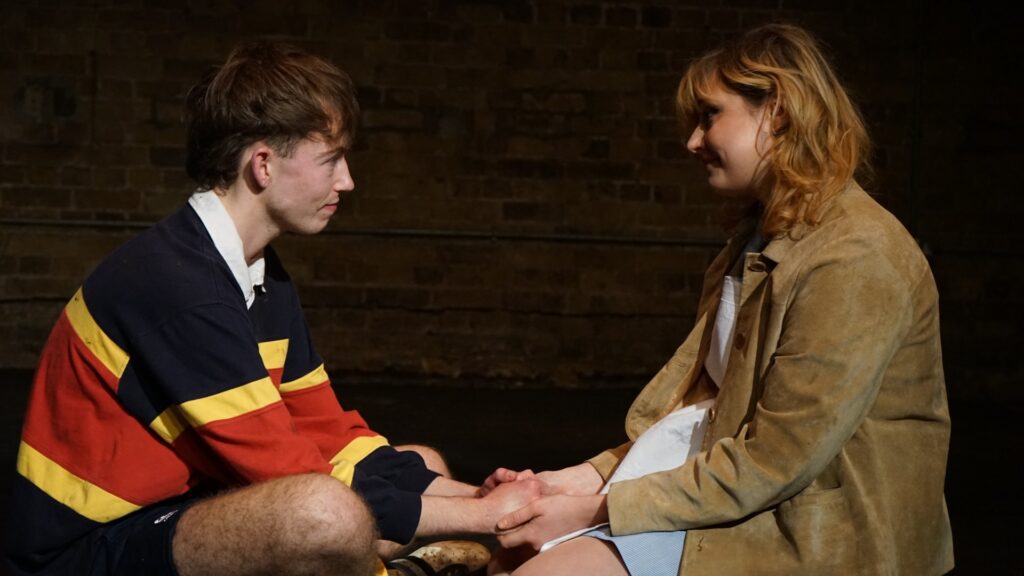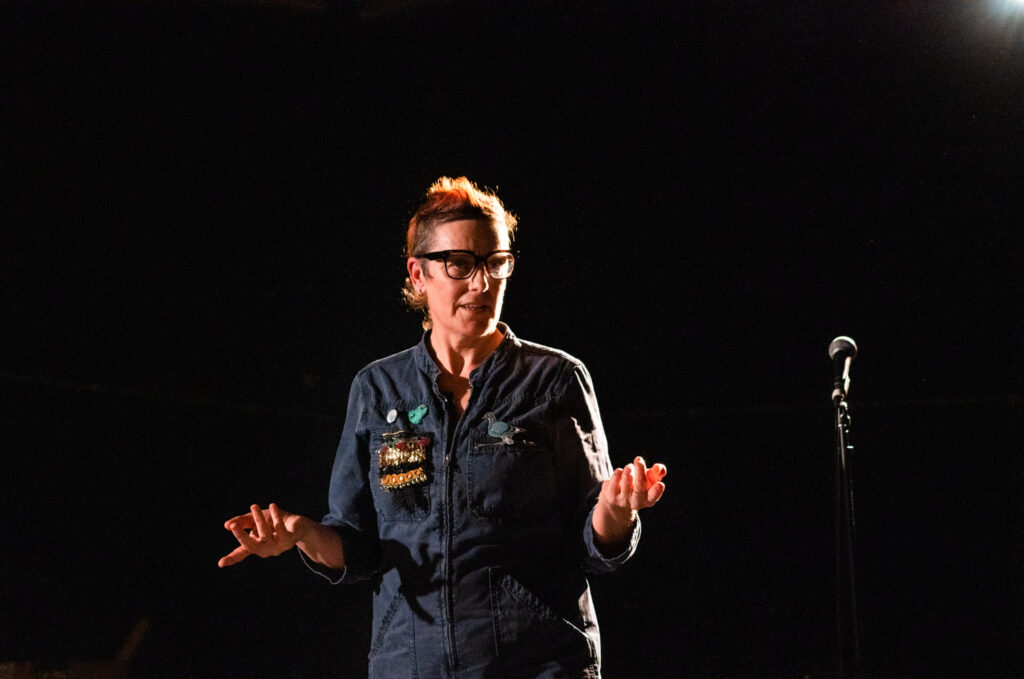Jasmine Donahaye says the Dylan Thomas centenary celebrations have gone too far.
Recently, watching John Michael McDonagh’s The Guard for the first time, I was so alarmed by one scene that I got up to close the curtains in case my neighbours saw. It was a scene so heretical that I was amazed a copy of the film was available, uncensored, in a Welsh public library. In this shocking scene, three gangster-drug-smugglers discuss who their favourite philosophers are:
‘Bertrand Russell,’ says Clive Cornell, an achingly world-weary Londoner played by Mark Strong.
‘Bertrand Russell! You listening to him? The fucking English – everything has to be fucking English,’ objects Liam Cunningham’s character, Francis Sheehy-Skeffington. ‘Name your favourite philosopher – and lo and behold, he’s fucking English.’
Clive points out that Bertrand Russell was Welsh.
‘Bertrand Russell was Welsh?’ says Francis, surprised. He pauses. ‘You know I never knew that,’ he says. ‘I didn’t think anybody interesting was Welsh.’
‘Dylan Thomas,’ says Clive.
‘Like I said,’ replies Francis.
Of course if you’re Irish, you can say things like that, but if you say it in Wales, they’ll come for you in the night. Were I to express publicly the opinion that there’s more to Wales than Dylan Thomas, that there are other far more interesting Welsh writers than Dylan Thomas, that an obsession with Dylan Thomas damages Wales nationally and internationally – as The Guard indicates – I’d be hung by my toes from the Severn Bridge, because that’s heresy, that is. Or at least so I’ve always believed. Recently, however, I’ve come to understand that it is not heresy but the result of a little-known illness.
As an individual suffering from an illness over which he or she has no control cannot be held to account for its symptoms, I feel I can take the rather daunting step of discussing publicly what I and others are suffering in shame and in secrecy – namely, a pathological lack of interest in Dylan Thomas.
This state of indifference, it emerges, is just the early stage of a condition called dylanphobia, which has only this year been recognised by psychologists. At the best of times, Wales can be a bad place to live if you suffer from this condition, but the early stage is, for the most part, manageable. Under normal circumstances it’s possible to cope with exposure, which triggers symptoms, and usually this is only slightly disabling. This year, however, is very difficult for people like me, because, as some will have noticed, 2014 is the centenary of Dylan Thomas’s birth. In 2014, if you are unfortunate enough to suffer from dylanphobia, your health is likely to be in serious danger, and so is the health and safety of those around you. This usually mild condition can rapidly degenerate in extreme circumstances, such as those in which, for example, the sufferer experiences sustained or excessive exposure to the phobia trigger. In such cases, debilitating progression can be quick, with disinterest shifting to severe aversion, and then blossoming horribly into paralysing phobia and, ultimately, psychosis. The symptoms of intermediate dylanphobia are embarrassing: involuntary twitching of the hands, an accelerated heart-rate, excessive perspiration, and, on sudden unanticipated exposure, an urgent need to empty the bowels. Advanced dylanphobia is when the condition becomes a danger to others: those in its grip should be kept away from sharp objects, matches, containers of artificial fertiliser, and Twitter.
Dylanphobia is the latest condition to be added to the Diagnostic and Statistical Manual of Mental Disorders (DSM-5). Prescribed treatment is, in the first instance, reduction in exposure, followed by cognitive-behavioural therapy. This addition to the list of recognised phobias is a welcome development for sufferers like me: it is a relief to find your symptoms listed, and to be able to identify your condition, and it can be a comfort to discover you are not alone, and to know that treatment is possible. Unfortunately, what has gone unrecognised so far is what might be seen as the counterpart to dylanphobia, or its pathological twin or opposite – dylanmania. This is problematic, because dylanmania is, arguably, a much more serious condition.
On the evidence, the entire 2014 budget for the Arts Council has been co-opted by those suffering from dylanmania – film, theatre, dance, and visual art, as well as the ACW’s allocation to Literature Wales. So too, it appears, has a substantial part of the budget for television and radio in 2014, and Welsh Government departments and local authorities have also been affected. One might suppose that this could prove a positive thing for all those who do not suffer from dylanphobia, including those who only manifest a very mild form of dylanmania (for example, a tendency to recite ‘Do not go gentle into that good night’). The reverse appears to be true, however, for the evidence suggests that repeated and sustained exposure in fact leads to much higher rates of dylanphobia in the general population. The evidence is by no means conclusive (as patients are reluctant to talk about their condition, either because of an irrational fear of persecution, or because of embarrassment), but it is nevertheless compelling.
Some people I very much like and respect are interested in Dylan Thomas. This is something that dylanphobia sufferers find hard to understand. Many people I know, including friends, colleagues, and associates who are writers, critics, editors and academics, have been participating in the national dylanmania spectacle of Wales that has taken over this year: they have been reading, performing, praising, celebrating, interpreting, commissioning and analysing on television and radio, at literature festivals and conferences, in public lectures and performances, in exhibitions, the broadsheet press and in journals – and, of course, on social media. I watch closely to try to understand their condition, though it makes me twitch, sweat and swear, and do other unseemly things. Disagreements among those suffering advanced forms of dylanmania have led to brawls and challenges to single combat; public contests and pistols at dawn, all of which helps illustrate why it is urgent that this condition be recognised and treated. The prevalence of dylanmania does mean that if you’re a writer or artist in Wales, and, like me, suffer somewhere along the dylanphobic spectrum, you’d be advised to get yourself to a therapist, because Dylan Thomas is where the money and the attention is this year – whether performing Dylan, reading Dylan, interpreting Dylan, presenting Dylan, painting Dylan, dancing Dylan, or bleeding Dylan.
Last year, despite manifesting the mild, early stage of dylanphobia, I myself agreed to co-lead one of Literature Wales’s tours associated with the centenary celebrations: it wasn’t to be about Dylan Thomas himself, but about Caitlin Thomas, which seemed safe enough for a phobic like me. But that was last year – last year, when I was still innocent; last year, before I knew what the dylanmania spectacle would do to Wales and all who live in her. In 2013 I could still say his name out loud without twitching. In 2013 I could still see his name in print without sweating. This year things are different. This year dylanmania has taken over the country – and advanced dylanphobia has taken over me.
Six months into 2014, I daren’t leave the house anymore, let alone travel to Swansea. The cumulative exposure has triggered extreme reactions, and the unpredictability of my response to further exposure is too dangerous. If I go out, I will see his face, his name, his signature on buses, on buildings, on banners, on posters – even in the foam of a cappuccino. His words are on walls and in pavements and in print. If I turn on the radio, if I go online, if I open a paper I know I risk being exposed to triggers. Even the National Library, until now a cloister, a haven, a calm and reliable Dylan-Thomas-free zone, has succumbed to a Dylan Thomas exhibition. Nowhere is safe. The fight-or-flight symptoms are horrible, painful, and deeply socially embarrassing – and I fear they’re only going to get worse.
I am sure that few sufferers would expect everyone else to accommodate the needs of dylanphobics at the expense of their own wellbeing. Equally, I am sure that fellow sufferers would not object to some support being allocated to mark the Dylan Thomas centenary. After all, he’s a well-known Welsh writer, and he’s good for tourism, and tourism, as we know and dutifully accept, is a powerful and hungry deity to whom we must all make burnt offerings and bloody sacrifices.
How much of a sacrifice must we make, though? At what cost? How much damage are those suffering from dylanmania going to be allowed to do before the condition is recognised, and the danger averted? I fear it is too late, and the damage is already done. Consequently, I take solace in the only thing available to me, which is to watch The Guard again. This has nothing whatsoever to do with the inordinately high regard I have for Liam Cunningham – quite the contrary. I watch the film for its therapeutic properties, and I strongly recommend it to others for this purpose. Those who are in the grip of advanced dylanmania will be glad to know that at the end of the film Cunningham’s character dies nastily (be warned, Game of Thrones fans – he usually does), but I don’t watch that distressing part. Instead I watch the heretical Bertrand Russell scene, and am reassured. It makes my twitching go still and my violently anti-social inclinations recede. I realise the therapeutic respite it offers me is delusional – because here, in John Michael McDonagh’s contemptuous imagination, I find evidence to support what I know is an entirely irrational and pathological belief: that reinforcing Dylan Thomas as the totality of Wales can do the country no good at all, but instead has damaged its standing, and made it a laughing stock.






Seriously though, Jasmine has a valid point. As a publisher of books by Welsh and Wales based authors, this saturation of the ‘literary’ scene in Wales by ‘Dylanmania’ may well be a disservice to the many talented new and modern writers with a focus or interest in more important literary or poetical matters. As an editor in receipt of many appalling ‘homages’ to Dylan Thomas I may have to resort to drink (as Mr.Thomas did) to dull the pain of having to read them before metaphorically throwing a manuscript ‘… gentle into that good night’.
As Ms.Donahaye is at Swansea she is at ‘ground zero’ for the DTM’s, so she has my sympathy. Nevertheless, I am reassured by my doctor that the condition (Dylanphobia) is not fatal and should pass when the Centenary is over and the ridiculous writing shed is chopped up for firewood.
Jasmine,
Congratulations! I ‘came out’ just over a decade ago:
Portrait Of The Piss-Artist
A refreshing perspective that has some close brushes with humour, but stretches a rather weak joke until it screams for mercy. Perhaps the real irony about ‘Dylanomania’ is that Mr. T surely never took himself as seriously as his acolytes apparently need to. Alcohol may have been his way of coping with the painful and potentially crazy-making (or so I imagine, having no personal experience of it) gap between actual artistic merit and public adulation, that is an occupational hazard of becoming a ‘star’. Time for someone to make a Welsh version of the Monty Python classic (and call it “The Life of Dai”?) about an interesting but not so exceptional Welsh poet being forced unwillingly into the role of a literary national messiah?
This is very troubling, but as there is a long waiting list for treatment I suggest you find somewhere quiet to rest in the sun. I’m told Cwmdonkin Park is quite nice, as long as you avoid the hunchback. Take a travel brochure with you, as you may want to leave the country in 2016 to escape the Shakespeare quatercentenary.
What a load of facetious whinging.
Dear Jasmine,
You say:
” … I and others are suffering in shame and in secrecy – namely, a pathological lack of interest in Dylan Thomas.”
Is it necessarily pathological? My concern is whether or not the condition could be either contagious or infectious. If the former, with whom should one avoid contact. If the latter, where may one breathe easy?
Excuse me while I open this letter.
Oh, the results are back. I already have it and . . . gosh; it’s genetic!
Best wishes,
James
“Thomas? Oh, RS was a major poet”
“No, Dylan, of course”
“Ah, that one. Not in the same league, really”
“But surely -”
“- It’s what they write that matters, not what is written about them”
Jasmine, God bless you for having the courage to say what a lot of us have been thinking – except you said it far more eloquently.
In fairness, Dylan had a nice turn of phrase but there was always something of the Amis ‘professional Welshman’ about him – strictly for the tourists. No one did more to cement the perception of the Welsh as ‘quaint,’ to use Professor Schama’s infamous expression. As Paul Johnson pointed out, his greatest writing took the form of begging letters. Is that perhaps symbolic of modern Wales?
If we want to improve both the self-image and the global image of the Welsh, it might be a good place to start if our cultural Establishment did more to popularise the honourable tradition of Anglo-Welsh poetry of which Dylan, by his own admission, was not part, or at least only on the fringe.
An even better next step would be to ask why Wales is not making film and television of the quality of ‘The Guard’ and ‘Calvary.’
Finally, given the excellence of the rest of the article, the ‘Thrones’ spoiler is just about forgivable – but only because Cunningham’s Ser Davos is so likable that we should already have guessed that GRRM is going to do to him what he always does to people we love.
It might have been worse; he might have been a war poet too…
John Winterson Richards, I assure you that’s not a Game of Thrones spoiler – that really would put me beyond the pale. I don’t know anything about the future of Davos.
Americans like Dylan. His admirers include that overrated composer of hackneyed songs Bob Dylan to the former President Clinton. Since the Welsh lack self-esteem they always take other people’s judgements of them as definitive and like the British as a whole they are excessively influenced by the Americans. Of course given American interest you can make a quid or two out of Dylan. Fat chance with RS and even less chance with Waldo or TH Parry-Williams. But popular culture regularly commits greater atrocities than tired recycling of Dylan Thomas material so the sensitive souls of Dylanphobes must be ravaged every time they turn on the telly. “The Valleys” anyone? .
The Dylan Thomas centenary has only gone too far in the poet’s native Wales. The London celebrations will make some real progress. This symposium will be taking it to the wider audience: https://tickets.kingsplace.co.uk/booking/production/syos/14564?performance=
Jasmine, thanks for the reassurance – although it is still probably emotionally safer to remain pessimistic.
It is also rather worrying to find oneself actually using the words “another good comment from R Tredwyn.” A rest cure is clearly overdue. New Quay is always soothing… Oh… maybe not this time.